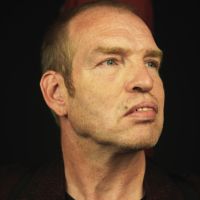
The native-born Austrian, hailing from Stokerau (a suburb of Vienna) has been a truly intrepid musical warrior, involved in such a diversity and eclectic range of projects and musical formations throughout the last quarter century which awaken memories of Miles Davis in his ability to crossover seamlessly between musical genres and collaborate tirelessly with fellow colleagues; whether Jazz, Rock, Pop, Classical, World Music, Avant-garde or in Free Improvisation, Karl Ritter never fails to impress us with a unique musical expression entirely his own. He has made a point throughout his career to collaborate and build bridges between myriad projects, no matter how far apart or disconnected from the surface they may seem, and continually explore every avenue available towards the means that bring his ideas, or compositions to their intuitional and perfected end.
What makes a musician that special class of artist we call a “virtuoso”, is it technical mastery of an instrument alone? Or is there something more required to reach that level of artistic self-expression which places one in a singular place within the music world; the courage to leave well worn and established paths, in order to invite out of the unknown, the creation, the birth of something new. Karl Ritter has always defended himself and his music from categorization or strict definition, and has in this sense, with complete consistency never allowed himself to be tied up in the corset of tradition. He is most at home strandling two stools, between myriad styles from which he meticulously and scientifically develops and brings to life, performed with technical brilliance, and despite its complexity, is homogenously transported with upmost facility and the elegance only a master can exude. The Lower-Austrian born guitarist began the violin at six, found little to keep him interested, and showing little passion for it, switched to the guitar at 12, and finding an immediate resonance and creative spark, began nascent compositional work, but more importantly the realization and discovery of his passion and desire to improvise, and the joy that it brought him.
As he grew older, the crystallization of a unique fusion of musical styles and techniques, spanning all genres and forms, and fueled by the conscious intent to forge an individual style and musical language was his main focus, as has been up until present day, as he continues to refine, reshape and reconstruct the mesh of musical probabilities that at first search for, and then discovers a way to break free from the bondage of traditional forms and antiquated banal structures.
1980 saw the production of his debut album “Ex-podo-Z” which he released on his own label, and which brought him both rousing success and professional respect, leading to a round of job offerings including commissions from the Viennese Renaissance Theater as well as a series of radio dramas for the Bavarian and Austrian Broadcasting Companies. As he grew in popularity he became a member of the “Ostbahn Kurti und die Chefpartie” in which he stayed active between 1988 until 1994. It was in 1993, however, that he completed a long awaited project in the realization of “Perikato”, a collaboration with the Austrian composer Thomas Pernes, in which he set out to dissolve the ideological boundaries between “classical” and “pop” music. Shortly thereafter he completed the production of his first solo CD “Dobromann”.
Following these successes and productions, came an immense explosion of diverse musical productions, being that he had no fixed group or project per se, he found himself involved in a plentitude of different contexts, working in diverse musical genres, and with all walk of musical personalities. During this time, for example came the score for the films, “Shwarzfahrer” and “Blutrausch”, performance and installation works for “Musik Aktuell” in Lower-Austria, the completion of different tours, (including one through Zimbabwe) and the foundation in 2001 of the record label Windhund Records, in coöporation with João de Bruçó, Achim Tang, Herbert Reisinger, Alex Rathner and Peter Kaizar.
Throughout the last 10 years Karl Ritter has been highly productive in different facets of the musical world; releasing albums with a range of diverse projects such as the “Klassiker Atmen” (2004), “the Red and Blue Album” (2007) as well as the band project named Weiße Wände (White Walls) consisting of the band members Joanna Lewis, Franz Hautzinger, Erich Buchebner and Pirker who released the album “Nur für kurze Zeit” in 2007 as well as participating in a variety of national and international tours, films, and theater projects.
Despite turning 50 in 2009, Karl Ritter has been an untiring and pertinacious artist. Since 2009 he has dedicated himself to his trio (Karl Ritter Trio), which he has continually pushed to the furthest extremes of any definition of the word “Jazz”, in which he stretches every mode of experimentation and sonic definition in a soundscape which has no definition per se, and so elegantly and powerfully expresses the unique dimension of the energy which only he can express and translate. The album “Soundritual” (Sound Ritual) released in 2011, is a masterpiece of the singular electro-acoustic soundscape his trio is capable of realizing.
Foto: Lukas Beck
translated by: Austin Settle
http://www.karlritter.at/
